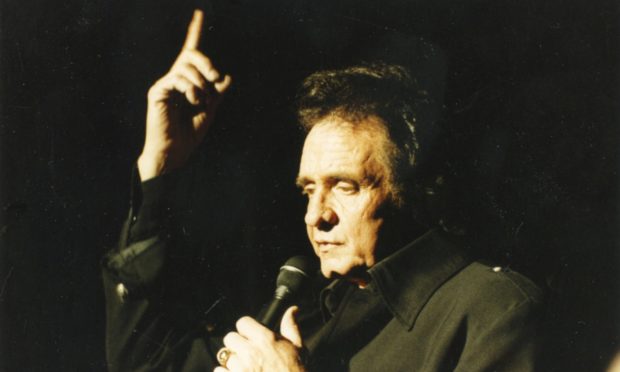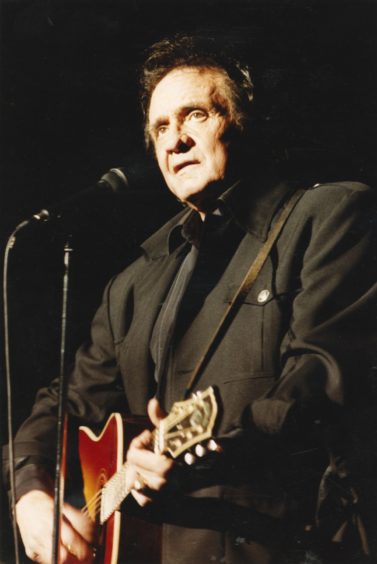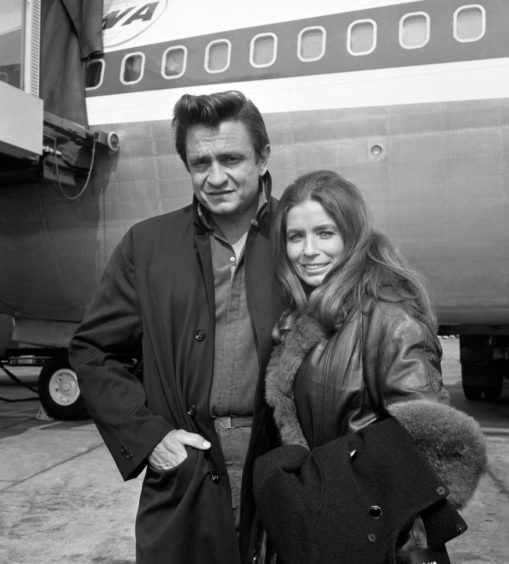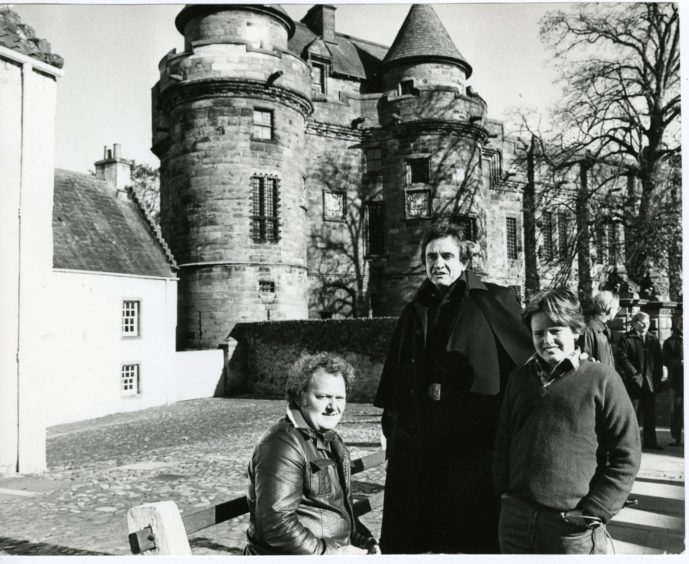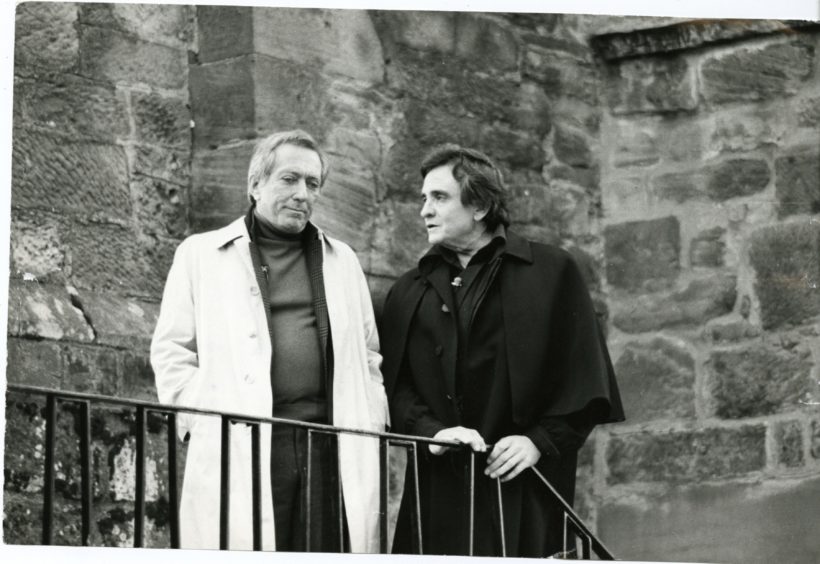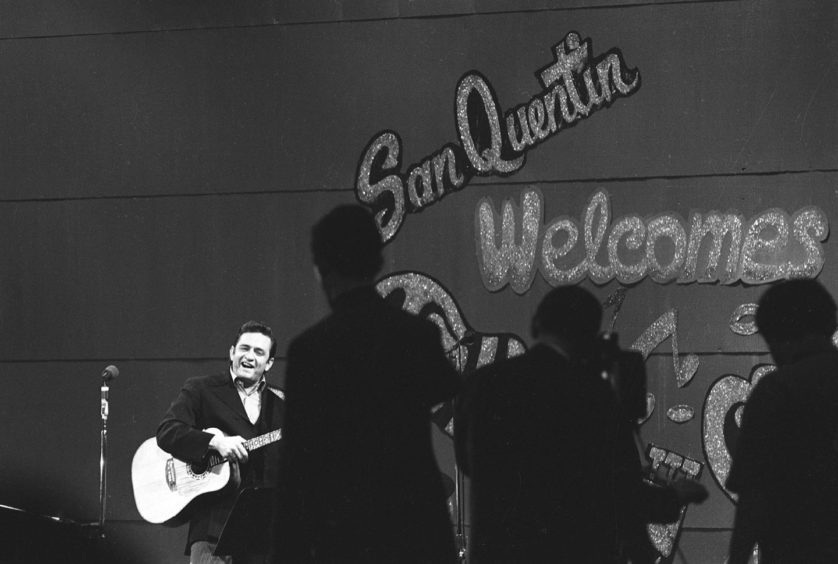Johnny Cash shrugged off a chest cold to Walk the Line at the Capitol Theatre in Aberdeen 30 years ago.
The Man in Black was on a downward slide and had not had a solo Top 10 hit since The Baron in 1981.
Sales were poor for his 77th album The Mystery of Life which was released to coincide with his UK tour which included a date at the Capitol Theatre in Aberdeen on April 2 1991.
Cash proved he was still at his best
But Cash went on to prove there was still plenty of gas in the tank as he wowed his fans in Aberdeen with a flawless performance featuring 21 songs.
He got on stage and claimed the chill from the North Sea had got in to his chest.
Who could tell though, with a voice that always had the texture of granite chips in a tar boiler?
Cash performed for three hours and delivered some of his biggest hits including Ring of Fire, Folsom Prison Blues, I Walk the Line and A Boy Named Sue.
A review in the Evening Express said: “The Man in Black knows the score.
“Aim straight, play it cool and make sure you hit the target, even when playing a no-frills frontier town like Aberdeen.
“After more than 30 years on the road the Country King shoots straight from the hip with a barrage of Classic Cash…a hit to start, a hit to finish and a three-hour hoedown in between.
“I Walk the Line, Ring of Fire, Folsom Prison Blues, Green Green Grass of Home, and of course, that perennial brat of a Boy Named Sue, all done with that choppy clipped precision that has become his hallmark.
“Not in quite so fine voice was Johnny’s partner from way back when, June Carter of Jackson and If I Were a Carpenter fame.
“Singing with her sisters as the Carter Family was a different kettle of fish.
“Their gospel and spiritual offerings were among the night’s highlights.
“Making a host of new fans was Irish songbird Sandy Kelly who first captured Mr Cash’s attention with her cover version of Crazy.
“They went on to make number one in the Irish charts with their duet the Woodcarver.
“Johnny Cash is simply a star.
“He sounds exactly like he always has and his material is as fresh as the day he cut his first album, believe it or not, back in the mid-fifties.”
Cash won new and young fans with comeback
Cash would, of course, rise again with producer Rick Rubin for the lauded series of American Recordings albums.
When the singer passed away on September 12 2003, it didn’t just end an incredible career.
It also halted yet another astonishing comeback by the Man In Black, whose series of albums at the end of 71 years had won him millions of new and young fans.
Recorded in his living-room, with just his beloved Martin guitar, Cash had done his own versions of songs by U2, Neil Diamond, Paul Simon, The Beatles, Bruce Springsteen and countless others.
Even after Cash died with complications from diabetes, he’d already recorded so many songs that more albums were released posthumously.
It’s also believed that the heartbreak of seeing wife June pass away just months earlier pushed him closer to the end.
He was buried next to June in Hendersonville Memory Gardens near his home in Hendersonville, Tennessee.
Broadcaster and DJ Jim Gellatly said: “I’d certainly put Johnny Cash up there with the greats.
“I saw him at Glastonbury in 1994 so not long after American Recordings had been released, but had been a fan of his earlier work.
“I’ve got great memories of the Capitol as a venue and I’m sure seeing a legend like Cash there would have been incredible.
“I’m guessing it would have been an older audience in 91 ahead of his revival a few years later.
“I think Scotland was very close to him when he discovered his Fife roots, and in turn there’s always been a big country music fanbase in Scotland, so the two go hand in hand.”
Johnny Cash traced his Scottish roots to Strathmiglo and nearby Falkland
Although he was born in Arkansas and it’s hard to think of many who represent American music better than Johnny Cash, his roots can be traced to Scotland — and to Scottish royalty.
In the late 1970s, Cash had decided to research his ancestral history after a chance encounter on a plane with the former laird of Falkland, the late Major Michael Crichton-Stuart.
Cash traced his roots to Strathmiglo and nearby Falkland, where there are farms and streets named after the clan.
The clan Cash originated from Malcolm’s sister, Ada, and the street Cash Feus in Strathmiglo still carries the name Cash, as do Easter Cash, Wester Cash and Cash Mill farms between Falkland and Strathmiglo.
The American Cash connection came about in 1612 when mariner William Cash sailed from Scotland to Salem, Massachusetts, with a boatload of pilgrims.
He later decided to settle in America.
Cash was almost killed by his pet ostrich
Cash could trace his roots all the way back to King Malcolm IV of Scotland and was so interested in his ancestors that he wanted to film a TV special in Fife.
He lined up in concert with fellow American superstar Andy Williams to sing Christmas carols with local schoolchildren at St Monans Parish Church in Fife in October 1981.
As 85 million fans of the Man in Black later tucked into turkey while watching his 1981 Christmas Special, few realised he had performed with bruised and cracked ribs after almost being killed by his pet ostrich before flying out to Scotland.
The singer kept a collection of exotic animals at his House of Cash office in Hendersonville, Tennessee, and if it hadn’t been for a big stick, he would have died.
He went on to describe how the male ostrich had jumped out and confronted him, crouched with wings spread and hissing nastily.
It had leaped in the air and kicked him in the gut with its huge toe.
The toe ripped him open and broke several ribs, and Cash reckoned if he hadn’t been wearing a very strong thick belt, his intestines would have been out and he’d have been a goner.
As it was, he kept swinging a big stick at his assailant and it made off.
Cash said: “He made contact – I’m sure there was never any question he wouldn’t – and frankly, I got off lightly.
“All he did was break my two lower ribs and rip my stomach open down to my belt.
“If the belt hadn’t been good and strong, with a solid belt buckle, he’d have spilled my guts exactly the way he meant to.
“As it was, he knocked me over onto my back and I broke three more ribs on a rock – but I had sense enough to keep swinging the stick, so he didn’t get to finish me.”
The show must go on
Cash insisted on performing in Falkland despite the pain and the shock and went on to play gigs in Edinburgh, Manchester, Sheffield, St Austell, Poole and London.
His son John Carter Cash, then aged 11, sang ‘Wee Cooper of Fife’, in another segment of the show which was described as a “Highland fling for the whole family”.
Filming took place on the beaches at Kinghorn, Anstruther and Elie before moving to St Monans where Cash was immediately set upon by autograph hunters.
He took nearly 15 minutes to reach St Monans Parish Church as he shook hands and chatted with locals.
Cash sang three Christmas carols with pupils from St Monans Primary School at the church.
Fans of the singer packed the church for the recording.
He returned to Falkland a year later with his wife June Carter Cash where a story about the time he stopped on the Falkland Hill road to help a young lad change the wheel on his car has gone down in folklore.
Cash visited Fife several times to try and plug gaps in his family tree before he died in Nashville in 2003 aged 71.
Cash’s daughter Rosanne, who is also an American country and western singer, embarked upon a spiritual quest to Fife following the death of her father to learn more about her family’s centuries-old link with the Howe of Fife.
